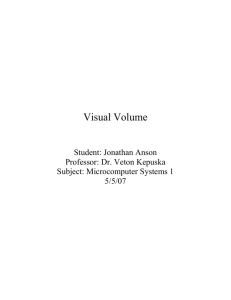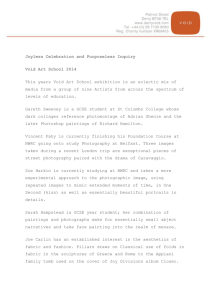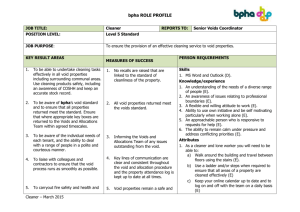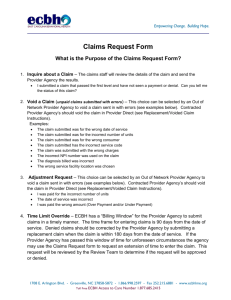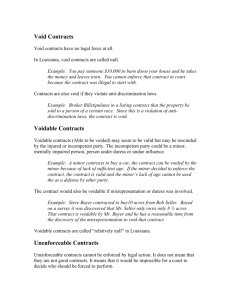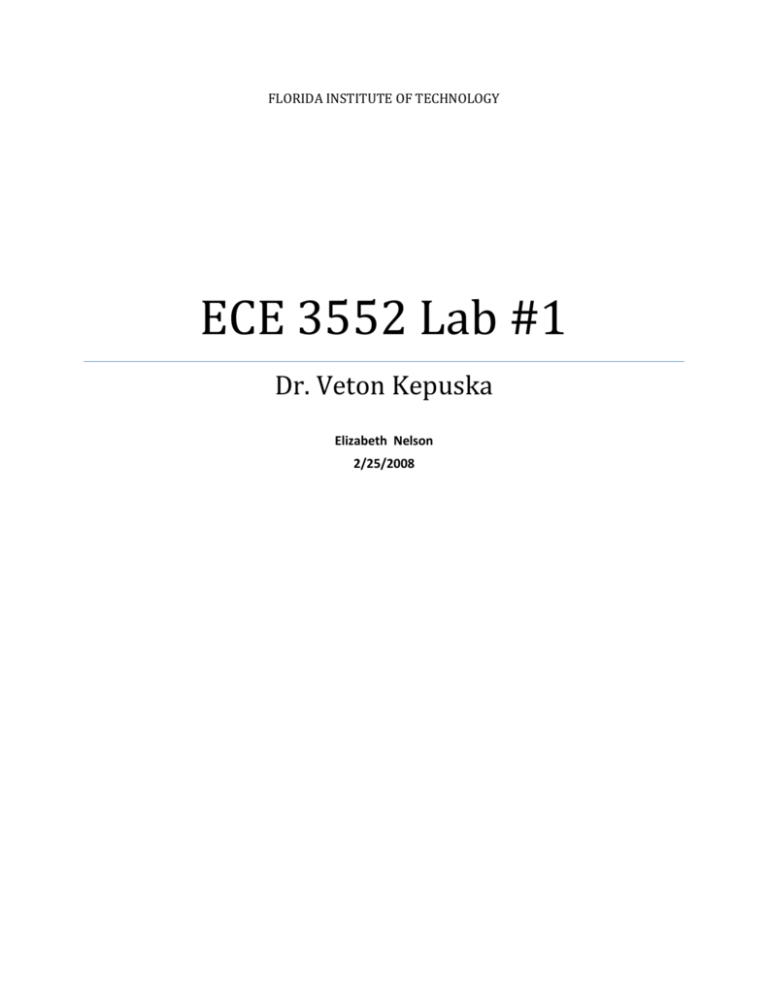
FLORIDA INSTITUTE OF TECHNOLOGY
ECE 3552 Lab #1
Dr. Veton Kepuska
Elizabeth Nelson
2/25/2008
Purpose:
The purpose of this lab is to introduce the student to Distributed Processing and Simulation of
actual Communication Channel. The goal is to use one board to accept the audio signal compress it and
transmit the compressed data to other board via RS232 channel. The receiving board will uncompress
data and play out the signal in real time.
Procedure:
1. Test the UART example code to be sure that data is being transmitted successfully. Use the
plotting function of the VisualDSP++ IDE to validate received char data.
2. Establish if the maximum UART transmission rate is sufficient to accommodate two audio chanel
streams with 48kHz.
a. Use the maximal baud rate (bps) of the UART as documented.
b. Compute if two channels of 24-bit audio stream with 48k samples per second can be
transmitted.
c. Would the reduction of the number of bits from 24 to 8 enable transmission over UART?
Use the mu-law function in the C/C++ run time library to compress the data.
d. If the sample rate is too high, one could down sample the original by a factor of two
(this results in a sample rate of 24kHz). Down-sampling requires that the bandwidth of
the signal be band-limited to below the bandwidth of the target prior to decimation.
DSP’s run-time library includes decimation and interpolation functions.
3. Combine Talk-through with the UART example code (it is included in the DSP examples as well).
4. Alter the Transmitter:
a. Use mu-law compression to reduce the 24-bit audio stream to 8 bits.
b. Send each channel as a consecutive 8 bit data over UART.
5. Alter Receiver:
a. Use inverse mu-law expansion to expand 8-bit audio stream to 24-bits.
b. Distribute two consecutive points to two audio channels.
Code and Code Description:
Transmitter
To begin with, the following header files were included: signal.h and filter.h. In addition to the
talkthrough variables, a variable BUFFER_SIZE was defined as being 2 bits using the #define method and
two variables one an array of char’s “tx_buffer” with size BUFFER_SIZE and one an unsigned int tx_cnt
were declared. Prototypes were declared for a function setup_UART and an interrupt handler for the
transmit_isr interrupt. The header file code will not be included.
Initialize.c
#include "Talkthrough.h"
//-------------------------------------------------------------------------//
// Function:
Init_EBIU
//
//
// Description:
//
//
can be //
//
//
This function initializes and enables asynchronous memory
banks in External Bus Interface Unit so that Flash A
accessed.
//
//-------------------------------------------------------------------------//
void Init_EBIU(void)
{
*pEBIU_AMBCTL0
= 0x7bb07bb0;
*pEBIU_AMBCTL1
= 0x7bb07bb0;
*pEBIU_AMGCTL
= 0x000f;
}
//-------------------------------------------------------------------------//
// Function:
Init_Flash
//
//
//
// Description:
This function initializes pin direction of Port A in Flash
A//
//
to output. The AD1836_RESET on the ADSP-BF533 EZ-KIT
board //
//
is connected to Port A.
//
//-------------------------------------------------------------------------//
void Init_Flash(void)
{
*pFlashA_PortA_Dir = 0x1;
}
//-------------------------------------------------------------------------//
// Function:
Init1836()
//
//
//
// Description:
This function sets up the SPI port to configure the AD1836.
//
//
The content of the array sCodec1836TxRegs is sent to
the
//
//
codec.
//
//-------------------------------------------------------------------------//
void Init1836(void)
{
int i;
int j;
static unsigned char ucActive_LED = 0x01;
// write to Port A to reset AD1836
*pFlashA_PortA_Data = 0x00;
// write to Port A to enable AD1836
*pFlashA_PortA_Data = ucActive_LED;
// wait to recover from reset
for (i=0; i<0xf0000; i++) asm("nop;");
// Enable PF4
*pSPI_FLG = FLS4;
// Set baud rate SCK = HCLK/(2*SPIBAUD) SCK = 2MHz
*pSPI_BAUD = 16;
// configure spi port
// SPI DMA write, 16-bit data, MSB first, SPI Master
*pSPI_CTL = TIMOD_DMA_TX | SIZE | MSTR;
// Set up DMA5 to transmit
// Map DMA5 to SPI
*pDMA5_PERIPHERAL_MAP
= 0x5000;
// Configure DMA5
// 16-bit transfers
*pDMA5_CONFIG = WDSIZE_16;
// Start address of data buffer
*pDMA5_START_ADDR = (void *)sCodec1836TxRegs;
// DMA inner loop count
*pDMA5_X_COUNT = CODEC_1836_REGS_LENGTH;
// Inner loop address increment
*pDMA5_X_MODIFY = 2;
// enable DMAs
*pDMA5_CONFIG = (*pDMA5_CONFIG | DMAEN);
// enable spi
*pSPI_CTL = (*pSPI_CTL | SPE);
// wait until dma transfers for spi are finished
for (j=0; j<0xaff0; j++) asm("nop;");
// disable spi
*pSPI_CTL = 0x0000;
}
//-------------------------------------------------------------------------//
// Function:
Init_Sport0
//
//
//
// Description:
Configure Sport0 for I2S mode, to transmit/receive data
//
//
to/from the AD1836. Configure Sport for external
clocks and //
//
frame syncs.
//
//-------------------------------------------------------------------------//
void Init_Sport0(void)
{
// Sport0 receive configuration
// External CLK, External Frame sync, MSB first, Active Low
// 24-bit data, Stereo frame sync enable
*pSPORT0_RCR1 = RFSR | RCKFE;
*pSPORT0_RCR2 = SLEN_24 | RXSE | RSFSE;
// Sport0 transmit configuration
// External CLK, External Frame sync, MSB first, Active Low
// 24-bit data, Secondary side enable, Stereo frame sync enable
*pSPORT0_TCR1 = TFSR | TCKFE;
*pSPORT0_TCR2 = SLEN_24 | TXSE | TSFSE;
}
//-------------------------------------------------------------------------//
// Function:
Init_DMA
//
//
//
// Description:
Initialize DMA1 in autobuffer mode to receive and DMA2 in
//
//
autobuffer mode to transmit
//
//-------------------------------------------------------------------------//
void Init_DMA(void)
{
// Set up DMA1 to receive
// Map DMA1 to Sport0 RX
*pDMA1_PERIPHERAL_MAP = 0x1000;
// Configure DMA1
// 32-bit transfers, Interrupt on completion, Autobuffer mode
*pDMA1_CONFIG = WNR | WDSIZE_32 | DI_EN | FLOW_1;
// Start address of data buffer
*pDMA1_START_ADDR = (void *)iRxBuffer1;
// DMA inner loop count
*pDMA1_X_COUNT = 4;
// Inner loop address increment
*pDMA1_X_MODIFY = 4;
// Set up DMA2 to transmit
// Map DMA2 to Sport0 TX
*pDMA2_PERIPHERAL_MAP = 0x2000;
// Configure DMA2
// 32-bit transfers, Autobuffer mode
*pDMA2_CONFIG = WDSIZE_32 | FLOW_1;
// Start address of data buffer
*pDMA2_START_ADDR = (void *)iTxBuffer1;
// DMA inner loop count
*pDMA2_X_COUNT = 4;
// Inner loop address increment
*pDMA2_X_MODIFY = 4;
}
//-------------------------------------------------------------------------//
// Function:
Enable_DMA_Sport
//
//
//
// Description:
Enable DMA1, DMA2, Sport0 TX and Sport0 RX
//
//-------------------------------------------------------------------------//
void Enable_DMA_Sport0(void)
{
// enable DMAs
*pDMA2_CONFIG
= (*pDMA2_CONFIG | DMAEN);
*pDMA1_CONFIG
= (*pDMA1_CONFIG | DMAEN);
// enable Sport0 TX and RX
*pSPORT0_TCR1
= (*pSPORT0_TCR1 | TSPEN);
*pSPORT0_RCR1
= (*pSPORT0_RCR1 | RSPEN);
}
//-------------------------------------------------------------------------//
// Function:
Init_Interrupts
//
//
//
// Description:
Initialize Interrupt for Sport0 RX
//
//-------------------------------------------------------------------------//
void Init_Interrupts(void)
{
// Set Sport0 RX (DMA1) interrupt priority to 2 = IVG9
*pSIC_IAR0 = 0xffffffff;
*pSIC_IAR1 = 0x3fffff2f;
*pSIC_IAR2 = 0xffffffff;
// assign ISRs to interrupt vectors
// Sport0 RX ISR -> IVG 9
register_handler(ik_ivg9, Sport0_RX_ISR);
register_handler(ik_ivg10, transmit_isr);
// enable Sport0 RX interrupt
*pSIC_IMASK = 0x00008200;
}
/********************************************************
Function to configure the UART & DMA
********************************************************/
void setup_UART()
{
// Clear the DMA configuration register
*pDMA7_CONFIG = 0x0;
// Configure the UART DMA parameter registers
// Transmit DMA
*pDMA7_START_ADDR = tx_buffer;
*pDMA7_X_COUNT = BUFFER_SIZE;
*pDMA7_X_MODIFY = 1;
*pDMA7_CONFIG = 0x1081;
// Autobuffer DMA Continously transmit
the data
// Configure the UART Control Registers
// Enable the divisor latch access
*pUART_LCR = 0x0080;
*pUART_DLH = 0x0000;
*pUART_DLL = 0x0002; //0x01FF;
// disable the divisor latch access
*pUART_LCR = 0x0000;
//Enable 8-bit mode without parity with 2 Stop Bits
*pUART_LCR = 0x0003;
//Enable interrupts for transmit
*pUART_IER = 0x0002;
// UART Clock Enabled
*pUART_GCTL = UCEN;
}
/********************************************************
Function to setup interrupts
********************************************************/
//void setup_interrupts()
//{
//Setup priorities for UART transmit
*pSIC_IAR1 = 0x3FFFFFFF;
register_handler(ik_ivg10, transmit_isr);
//Assign ISR to this
interrupt
//
*pSIC_IMASK = 0x00008000;
//Unmask
the UART transmit interrupt
//}
//
//
The only differences between this initialize.c and the original talkthrough initialize.c lie in the addition of
the setupUART function and in the addition of a transmit interrupt in the Init_interrupts function. The
setupUART is taken directly from the example UART code. The ik_ivg10 interrupt is then assigned to the
transmit ISR.
Process_data.c
The rest of the changes occurred in the process_Data file.
#include "Talkthrough.h"
//-------------------------------------------------------------------------//
// Function:
Process_Data()
//
//
//
// Description: This function is called from inside the SPORT0 ISR every
//
//
time a complete audio frame has been received. The
new
//
//
input samples can be found in the variables
iChannel0LeftIn,//
//
iChannel0RightIn, iChannel1LeftIn and
iChannel1RightIn
//
//
respectively. The processed
data should be stored
in
//
//
iChannel0LeftOut, iChannel0RightOut,
iChannel1LeftOut,
//
//
iChannel1RightOut, iChannel2LeftOut and
iChannel2RightOut //
//
respectively.
//
//-------------------------------------------------------------------------//
void Process_Data(void)
{
//iChannel0LeftOut = iChannel0LeftIn;
//iChannel0RightOut = iChannel0RightIn;
//iChannel1LeftOut = iChannel1LeftIn;
//iChannel1RightOut = iChannel1RightIn;
short tx_exp[2] = {0,0};
short mu_buffer[2] = {0,0};
tx_exp[0] = (short)(iChannel0LeftIn>>8);
tx_exp[0] /= 4;
tx_exp[1] = (short)(iChannel0RightIn>>8);
tx_exp[1] /=4;
mu_compress(tx_exp, mu_buffer, 2);
tx_buffer[0] = mu_buffer[0];
tx_buffer[1] = mu_buffer[1];
}
The function mu_compress requires inputs of an input array, an output array and a array size.
However, all of these must be data of 14 bits. To do this, the incoming data from the audio channel was
shifted 8 bits to become a 16 bit short and stored in a temporary array. The short was then divided by 4
(the equivalent of shifting another 2) to create a 14 bit piece of data. The array size is two so that each
transmission contains a bit from each stream allowing for real time play back on both channels. The
process is repeated for the second channel. Once the data has been shortened to 14 bits, the
mu_compress function further compresses it to 8 bits. This is then copied to the tx_buffer for
transmission over UART.
Receiver
The reciever’s header and initialization code are very similar with the exception that the buffer is named
rx_buffer instead of tx_buffer. They will not be provided here.
Process_data.c
#include "Talkthrough.h"
//-------------------------------------------------------------------------//
// Function:
Process_Data()
//
//
//
// Description: This function is called from inside the SPORT0 ISR every
//
//
time a complete audio frame has been received. The
new
//
//
input samples can be found in the variables
iChannel0LeftIn,//
//
iChannel0RightIn, iChannel1LeftIn and
iChannel1RightIn
//
//
respectively. The processed
data should be stored
in
//
//
iChannel0LeftOut, iChannel0RightOut,
iChannel1LeftOut,
//
//
iChannel1RightOut, iChannel2LeftOut and
iChannel2RightOut //
//
respectively.
//
//-------------------------------------------------------------------------//
void Process_Data(void)
{
//iChannel0LeftOut = iChannel0LeftIn;
//iChannel0RightOut = iChannel0RightIn;
//iChannel1LeftOut = iChannel1LeftIn;
//iChannel1RightOut = iChannel1RightIn;
short mu_exp[2] = {0, 0};
short rx_exp[2] = {0, 0};
mu_exp[0] = (short)rx_buffer[0];
mu_exp[1] = (short)rx_buffer[1];
mu_expand(mu_exp, rx_exp, 2);
iChannel0LeftOut = (int)(rx_exp[0]<<10);
iChannel0RightOut = (int)(rx_exp[1]<<10);
}
The only changes occurred in the process_data file. The incoming data was in the mu compression form
so first the incoming data is stored in a temporary array. The mu_expand function is then called to
expand the 8-bit data to 14 bits. Finally, the data is shifter back 10 bits to create a 24 bit sample and
copied to the appropriate output audio channel.
Conclusion:
For part one, it was decided that the maximum baud rate of the UART was:
𝑠𝑐𝑙𝑐𝑘
𝑠𝑐𝑙𝑐𝑘
∗ 8𝑏𝑝𝑠𝑎𝑚𝑝𝑙𝑒 =
𝑏𝑝𝑠
16
2
Two channels of 16-bit audio at 48kHz is:
16 ∗ 2 ∗ 48𝑘 = 1536𝑘𝑏𝑝𝑠
This is an extremely large bit rate for our sclck/2 UART, however, if they are each reduced to 8 bits, must
only be able to handle half of that bit rate. This can be done using mu compression.
It took a while for the UART code to work. First we had hardware problems in that not all cables
are sufficient to transmit data. Second there was some confusion as to what format needed to be used
to map the data and so the graphs were distorted. Finally, the UART functions worked but the
Talkthrough program would not work on it its own. As it turned out this was a hardware problem once
again.
In order to test, the mu compression and expansion was performed on one board and the result
played. This confirmed that the data was being transmitted correctly when played from one board to
the other. Some sound quality was lost, especially for lower frequencies it seemed.
Appendix A
Transmitter Code
Talkthrough .h
#ifndef __Talkthrough_DEFINED
#define __Talkthrough_DEFINED
//-------------------------------------------------------------------------//
// Header files
//
//-------------------------------------------------------------------------//
#include <sys\exception.h>
#include
#include
#include
#include
<CdefBF533.h>
<defBF533.h>
<signal.h>
<filter.h>
//-------------------------------------------------------------------------//
// Symbolic constants
//
//-------------------------------------------------------------------------//
// addresses for Port B in Flash A
#define pFlashA_PortA_Dir
(volatile unsigned char *)0x20270006
#define pFlashA_PortA_Data
(volatile unsigned char *)0x20270004
// names for codec registers,
#define DAC_CONTROL_1
#define DAC_CONTROL_2
#define DAC_VOLUME_0
#define DAC_VOLUME_1
#define DAC_VOLUME_2
#define DAC_VOLUME_3
#define DAC_VOLUME_4
#define DAC_VOLUME_5
#define ADC_0_PEAK_LEVEL
#define ADC_1_PEAK_LEVEL
#define ADC_2_PEAK_LEVEL
#define ADC_3_PEAK_LEVEL
#define ADC_CONTROL_1
#define ADC_CONTROL_2
#define ADC_CONTROL_3
used for sCodec1836TxRegs[]
0x0000
0x1000
0x2000
0x3000
0x4000
0x5000
0x6000
0x7000
0x8000
0x9000
0xA000
0xB000
0xC000
0xD000
0xE000
// names for slots in ad1836 audio frame
#define INTERNAL_ADC_L0
0
#define INTERNAL_ADC_R0
2
#define INTERNAL_DAC_L0
0
#define INTERNAL_DAC_R0
2
#define INTERNAL_ADC_L1
1
#define INTERNAL_ADC_R1
3
#define INTERNAL_DAC_L1
1
#define INTERNAL_DAC_R1
3
// size of array sCodec1836TxRegs
#define CODEC_1836_REGS_LENGTH
// SPI transfer mode
#define TIMOD_DMA_TX 0x0003
// SPORT0 word length
#define SLEN_24
0x0017
// DMA flow mode
#define FLOW_1
0x1000
#define BUFFER_SIZE 2
11
//-------------------------------------------------------------------------//
// Global variables
//
//-------------------------------------------------------------------------//
extern int iChannel0LeftIn;
extern int iChannel0RightIn;
extern int iChannel0LeftOut;
extern int iChannel0RightOut;
extern int iChannel1LeftIn;
extern int iChannel1RightIn;
extern int iChannel1LeftOut;
extern int iChannel1RightOut;
extern volatile short sCodec1836TxRegs[];
extern volatile int iRxBuffer1[];
extern volatile int iTxBuffer1[];
extern char tx_buffer[BUFFER_SIZE];
extern volatile unsigned int tx_cnt;
//-------------------------------------------------------------------------//
// Prototypes
//
//-------------------------------------------------------------------------//
// in file Initialize.c
void Init_EBIU(void);
void Init_Flash(void);
void Init1836(void);
void Init_Sport0(void);
void Init_DMA(void);
void Init_Interrupts(void);
void Enable_DMA_Sport(void);
void Enable_DMA_Sport0(void);
void setup_UART();
// in file Process_data.c
void Process_Data(void);
// in file ISRs.c
EX_INTERRUPT_HANDLER(Sport0_RX_ISR);
EX_INTERRUPT_HANDLER(transmit_isr);
#endif //__Talkthrough_DEFINED
Initialize.c
#include "Talkthrough.h"
//-------------------------------------------------------------------------//
// Function:
Init_EBIU
//
//
// Description:
//
//
can be //
//
//
This function initializes and enables asynchronous memory
banks in External Bus Interface Unit so that Flash A
accessed.
//
//-------------------------------------------------------------------------//
void Init_EBIU(void)
{
*pEBIU_AMBCTL0
= 0x7bb07bb0;
*pEBIU_AMBCTL1
= 0x7bb07bb0;
*pEBIU_AMGCTL
= 0x000f;
}
//-------------------------------------------------------------------------//
// Function:
Init_Flash
//
//
//
// Description:
This function initializes pin direction of Port A in Flash
A//
//
to output. The AD1836_RESET on the ADSP-BF533 EZ-KIT
board //
//
is connected to Port A.
//
//-------------------------------------------------------------------------//
void Init_Flash(void)
{
*pFlashA_PortA_Dir = 0x1;
}
//-------------------------------------------------------------------------//
// Function:
Init1836()
//
//
//
// Description:
This function sets up the SPI port to configure the AD1836.
//
//
The content of the array sCodec1836TxRegs is sent to
the
//
//
codec.
//
//-------------------------------------------------------------------------//
void Init1836(void)
{
int i;
int j;
static unsigned char ucActive_LED = 0x01;
// write to Port A to reset AD1836
*pFlashA_PortA_Data = 0x00;
// write to Port A to enable AD1836
*pFlashA_PortA_Data = ucActive_LED;
// wait to recover from reset
for (i=0; i<0xf0000; i++) asm("nop;");
// Enable PF4
*pSPI_FLG = FLS4;
// Set baud rate SCK = HCLK/(2*SPIBAUD) SCK = 2MHz
*pSPI_BAUD = 16;
// configure spi port
// SPI DMA write, 16-bit data, MSB first, SPI Master
*pSPI_CTL = TIMOD_DMA_TX | SIZE | MSTR;
// Set up DMA5 to transmit
// Map DMA5 to SPI
*pDMA5_PERIPHERAL_MAP
= 0x5000;
// Configure DMA5
// 16-bit transfers
*pDMA5_CONFIG = WDSIZE_16;
// Start address of data buffer
*pDMA5_START_ADDR = (void *)sCodec1836TxRegs;
// DMA inner loop count
*pDMA5_X_COUNT = CODEC_1836_REGS_LENGTH;
// Inner loop address increment
*pDMA5_X_MODIFY = 2;
// enable DMAs
*pDMA5_CONFIG = (*pDMA5_CONFIG | DMAEN);
// enable spi
*pSPI_CTL = (*pSPI_CTL | SPE);
// wait until dma transfers for spi are finished
for (j=0; j<0xaff0; j++) asm("nop;");
// disable spi
*pSPI_CTL = 0x0000;
}
//-------------------------------------------------------------------------//
// Function:
Init_Sport0
//
//
//
// Description:
Configure Sport0 for I2S mode, to transmit/receive data
//
//
to/from the AD1836. Configure Sport for external
clocks and //
//
frame syncs.
//
//-------------------------------------------------------------------------//
void Init_Sport0(void)
{
// Sport0 receive configuration
// External CLK, External Frame sync, MSB first, Active Low
// 24-bit data, Stereo frame sync enable
*pSPORT0_RCR1 = RFSR | RCKFE;
*pSPORT0_RCR2 = SLEN_24 | RXSE | RSFSE;
// Sport0 transmit configuration
// External CLK, External Frame sync, MSB first, Active Low
// 24-bit data, Secondary side enable, Stereo frame sync enable
*pSPORT0_TCR1 = TFSR | TCKFE;
*pSPORT0_TCR2 = SLEN_24 | TXSE | TSFSE;
}
//-------------------------------------------------------------------------//
// Function:
Init_DMA
//
//
//
// Description:
Initialize DMA1 in autobuffer mode to receive and DMA2 in
//
//
autobuffer mode to transmit
//
//-------------------------------------------------------------------------//
void Init_DMA(void)
{
// Set up DMA1 to receive
// Map DMA1 to Sport0 RX
*pDMA1_PERIPHERAL_MAP = 0x1000;
// Configure DMA1
// 32-bit transfers, Interrupt on completion, Autobuffer mode
*pDMA1_CONFIG = WNR | WDSIZE_32 | DI_EN | FLOW_1;
// Start address of data buffer
*pDMA1_START_ADDR = (void *)iRxBuffer1;
// DMA inner loop count
*pDMA1_X_COUNT = 4;
// Inner loop address increment
*pDMA1_X_MODIFY = 4;
// Set up DMA2 to transmit
// Map DMA2 to Sport0 TX
*pDMA2_PERIPHERAL_MAP = 0x2000;
// Configure DMA2
// 32-bit transfers, Autobuffer mode
*pDMA2_CONFIG = WDSIZE_32 | FLOW_1;
// Start address of data buffer
*pDMA2_START_ADDR = (void *)iTxBuffer1;
// DMA inner loop count
*pDMA2_X_COUNT = 4;
// Inner loop address increment
*pDMA2_X_MODIFY = 4;
}
//-------------------------------------------------------------------------//
// Function:
Enable_DMA_Sport
//
//
//
// Description:
Enable DMA1, DMA2, Sport0 TX and Sport0 RX
//
//-------------------------------------------------------------------------//
void Enable_DMA_Sport0(void)
{
// enable DMAs
*pDMA2_CONFIG
= (*pDMA2_CONFIG | DMAEN);
*pDMA1_CONFIG
= (*pDMA1_CONFIG | DMAEN);
// enable Sport0 TX and RX
*pSPORT0_TCR1
= (*pSPORT0_TCR1 | TSPEN);
*pSPORT0_RCR1
= (*pSPORT0_RCR1 | RSPEN);
}
//-------------------------------------------------------------------------//
// Function:
Init_Interrupts
//
//
//
// Description:
Initialize Interrupt for Sport0 RX
//
//-------------------------------------------------------------------------//
void Init_Interrupts(void)
{
// Set Sport0 RX (DMA1) interrupt priority to 2 = IVG9
*pSIC_IAR0 = 0xffffffff;
*pSIC_IAR1 = 0x3fffff2f;
*pSIC_IAR2 = 0xffffffff;
// assign ISRs to interrupt vectors
// Sport0 RX ISR -> IVG 9
register_handler(ik_ivg9, Sport0_RX_ISR);
register_handler(ik_ivg10, transmit_isr);
// enable Sport0 RX interrupt
*pSIC_IMASK = 0x00008200;
}
/********************************************************
Function to configure the UART & DMA
********************************************************/
void setup_UART()
{
// Clear the DMA configuration register
*pDMA7_CONFIG = 0x0;
// Configure the UART DMA parameter registers
// Transmit DMA
*pDMA7_START_ADDR = tx_buffer;
*pDMA7_X_COUNT = BUFFER_SIZE;
*pDMA7_X_MODIFY = 1;
*pDMA7_CONFIG = 0x1081;
// Autobuffer DMA Continously transmit
the data
// Configure the UART Control Registers
// Enable the divisor latch access
*pUART_LCR = 0x0080;
*pUART_DLH = 0x0000;
*pUART_DLL = 0x0002; //0x01FF;
// disable the divisor latch access
*pUART_LCR = 0x0000;
//Enable 8-bit mode without parity with 2 Stop Bits
*pUART_LCR = 0x0003;
//Enable interrupts for transmit
*pUART_IER = 0x0002;
// UART Clock Enabled
*pUART_GCTL = UCEN;
}
/********************************************************
Function to setup interrupts
********************************************************/
//void setup_interrupts()
//{
//Setup priorities for UART transmit
*pSIC_IAR1 = 0x3FFFFFFF;
register_handler(ik_ivg10, transmit_isr);
//Assign ISR to this
interrupt
//
*pSIC_IMASK = 0x00008000;
//Unmask
the UART transmit interrupt
//}
//
//
ISR.c
#include "Talkthrough.h"
//-------------------------------------------------------------------------//
// Function:
Sport0_RX_ISR
//
//
//
// Description: This ISR is executed after a complete frame of input data
//
//
has been received. The new samples are stored in
//
//
iChannel0LeftIn, iChannel0RightIn, iChannel1LeftIn
and
//
//
iChannel1RightIn respectively. Then the function
//
//
Process_Data() is called in which user code can be
executed.//
//
After that the processed values are copied from the
//
//
variables iChannel0LeftOut, iChannel0RightOut,
//
//
iChannel1LeftOut and iChannel1RightOut into the dma
//
//
transmit buffer.
//
//-------------------------------------------------------------------------//
EX_INTERRUPT_HANDLER(Sport0_RX_ISR)
{
// confirm interrupt handling
*pDMA1_IRQ_STATUS = 0x0001;
//
// copy input data from dma input buffer into variables
iChannel0LeftIn = iRxBuffer1[INTERNAL_ADC_L0];
iChannel0RightIn = iRxBuffer1[INTERNAL_ADC_R0];
//iChannel1LeftIn = iRxBuffer1[INTERNAL_ADC_L1];
iChannel1RightIn = iRxBuffer1[INTERNAL_ADC_R1];
// call function that contains user code
Process_Data();
// copy processed data from variables into dma output buffer
iTxBuffer1[INTERNAL_DAC_L0] = iChannel0LeftOut;
iTxBuffer1[INTERNAL_DAC_R0] = iChannel0RightOut;
//iTxBuffer1[INTERNAL_DAC_L1] = iChannel1LeftOut;
//iTxBuffer1[INTERNAL_DAC_R1] = iChannel1RightOut;
}
EX_INTERRUPT_HANDLER(transmit_isr)
{
*pDMA7_IRQ_STATUS |= DMA_DONE;
interrupt
tx_cnt++;
//clear the
}
main.c
//-------------------------------------------------------------------------//
//
//
Name:
//
Talkthrough for the ADSP-BF533 EZ-KIT Lite
//
//
//
//-------------------------------------------------------------------------//
//
//
//
(C) Copyright 2006 - Analog Devices, Inc. All rights reserved.
//
//
//
//
Project Name:
BF533 C Talkthrough I2S
//
//
//
//
Date Modified:
04/03/03
Rev 1.0
//
//
//
//
Software:
VisualDSP++4.5
//
//
//
//
Hardware:
ADSP-BF533 EZ-KIT Board
//
//
//
//
Connections:
Connect RSCLK0 to TSCLK0 together (Turn SW9 pin 6 on)
//
//
Connect RFS0 to TFS0 together (Turn SW9 pin 5
ON)
//
Connect an input source (such as a
radio) to the Audio
//
//
input jack and an output source (such as
headphones) to //
//
the Audio output jack
//
//
//
//
Purpose:
This program sets up the SPI port on the ADSP-BF533
to //
//
configure the AD1836 codec. The SPI port is
disabled
//
//
after initialization. The data to/from the
codec are
//
//
transfered over SPORT0 in I2S mode
//
//
//
//-------------------------------------------------------------------------//
#include "Talkthrough.h"
#include "sysreg.h"
#include "ccblkfn.h"
//-------------------------------------------------------------------------//
// Variables
//
//
//
// Description:
The variables iChannelxLeftIn and iChannelxRightIn contain
//
//
the data coming from the codec AD1836. The
(processed)
//
//
playback data are written into the variables
//
//
iChannelxLeftOut and iChannelxRightOut respectively,
which
//
//
are then sent back to the codec in the SPORT0 ISR.
//
//
The values in the array iCodec1836TxRegs can be
modified to //
//
set up the codec in different configurations
according to
//
//
the AD1885 data sheet.
//
//-------------------------------------------------------------------------//
// left input data from ad1836
int iChannel0LeftIn, iChannel1LeftIn;
// right input data from ad1836
int iChannel0RightIn, iChannel1RightIn;
// left ouput data for ad1836
int iChannel0LeftOut, iChannel1LeftOut;
// right ouput data for ad1836
int iChannel0RightOut, iChannel1RightOut;
// array for registers to configure the ad1836
// names are defined in "Talkthrough.h"
volatile short sCodec1836TxRegs[CODEC_1836_REGS_LENGTH] =
{
DAC_CONTROL_1
| 0x000,
DAC_CONTROL_2
| 0x000,
DAC_VOLUME_0
| 0x3ff,
DAC_VOLUME_1
| 0x3ff,
DAC_VOLUME_2
| 0x3ff,
DAC_VOLUME_3
| 0x3ff,
DAC_VOLUME_4
| 0x000,
DAC_VOLUME_5
| 0x000,
ADC_CONTROL_1
| 0x000,
ADC_CONTROL_2
| 0x000,
ADC_CONTROL_3
| 0x000
};
// SPORT0 DMA transmit buffer
volatile int iTxBuffer1[4];
// SPORT0 DMA receive buffer
volatile int iRxBuffer1[4];
//UART stuff
volatile unsigned int tx_cnt;
char tx_buffer[BUFFER_SIZE];
//-------------------------------------------------------------------------//
// Function:
main
//
//
//
// Description:
After calling a few initalization routines, main() just
//
//
waits in a loop forever. The code to process the
incoming //
//
data can be placed in the function Process_Data() in
the
//
//
file "Process_Data.c".
//
//-------------------------------------------------------------------------//
void main(void)
{
sysreg_write(reg_SYSCFG, 0x32);
Configuration Register
Init_EBIU();
Init_Flash();
Init1836();
Init_Sport0();
Init_DMA();
Init_Interrupts();
Enable_DMA_Sport0();
//Initialize System
setup_UART();
while(1);
}
Process_data.c
#include "Talkthrough.h"
//-------------------------------------------------------------------------//
// Function:
Process_Data()
//
//
//
// Description: This function is called from inside the SPORT0 ISR every
//
//
time a complete audio frame has been received. The
new
//
//
input samples can be found in the variables
iChannel0LeftIn,//
//
iChannel0RightIn, iChannel1LeftIn and
iChannel1RightIn
//
//
in
//
//
iChannel1LeftOut,
//
iChannel2RightOut
//
respectively. The processed
data should be stored
iChannel0LeftOut, iChannel0RightOut,
//
iChannel1RightOut, iChannel2LeftOut and
//
respectively.
//
//-------------------------------------------------------------------------//
void Process_Data(void)
{
//iChannel0LeftOut = iChannel0LeftIn;
//iChannel0RightOut = iChannel0RightIn;
//iChannel1LeftOut = iChannel1LeftIn;
//iChannel1RightOut = iChannel1RightIn;
short tx_exp[2] = {0,0};
short mu_buffer[2] = {0,0};
tx_exp[0] = (short)(iChannel0LeftIn>>8);
tx_exp[0] /= 4;
tx_exp[1] = (short)(iChannel0RightIn>>8);
tx_exp[1] /=4;
mu_compress(tx_exp, mu_buffer, 2);
tx_buffer[0] = mu_buffer[0];
tx_buffer[1] = mu_buffer[1];
//short mu_exp[2] = {0,0};
//short rx_exp[2] = {0,0};
//mu_exp[0] = (short)tx_buffer[0];
//mu_exp[1] = (short)tx_buffer[1];
//mu_expand(mu_exp, rx_exp, 2);
//iChannel0LeftOut = (int)(rx_exp[0]<<10);
//iChannel0RightOut = (int)(rx_exp[1]<<10);
}
Receiver Code
Talkthrough.h
#ifndef __Talkthrough_DEFINED
#define __Talkthrough_DEFINED
//-------------------------------------------------------------------------//
// Header files
//
//-------------------------------------------------------------------------//
#include
#include
#include
#include
#include
<sys\exception.h>
<CdefBF533.h>
<defBF533.h>
<signal.h>
<filter.h>
//-------------------------------------------------------------------------//
// Symbolic constants
//
//-------------------------------------------------------------------------//
// addresses for Port B in Flash A
#define pFlashA_PortA_Dir
(volatile unsigned char *)0x20270006
#define pFlashA_PortA_Data
(volatile unsigned char *)0x20270004
// names for codec registers,
#define DAC_CONTROL_1
#define DAC_CONTROL_2
#define DAC_VOLUME_0
#define DAC_VOLUME_1
#define DAC_VOLUME_2
#define DAC_VOLUME_3
#define DAC_VOLUME_4
#define DAC_VOLUME_5
#define ADC_0_PEAK_LEVEL
#define ADC_1_PEAK_LEVEL
#define ADC_2_PEAK_LEVEL
#define ADC_3_PEAK_LEVEL
#define ADC_CONTROL_1
#define ADC_CONTROL_2
#define ADC_CONTROL_3
used for sCodec1836TxRegs[]
0x0000
0x1000
0x2000
0x3000
0x4000
0x5000
0x6000
0x7000
0x8000
0x9000
0xA000
0xB000
0xC000
0xD000
0xE000
// names for slots in ad1836 audio frame
#define INTERNAL_ADC_L0
0
#define INTERNAL_ADC_R0
2
#define INTERNAL_DAC_L0
0
#define INTERNAL_DAC_R0
2
#define INTERNAL_ADC_L1
1
#define INTERNAL_ADC_R1
3
#define INTERNAL_DAC_L1
1
#define INTERNAL_DAC_R1
3
// size of array sCodec1836TxRegs
#define CODEC_1836_REGS_LENGTH
// SPI transfer mode
#define TIMOD_DMA_TX 0x0003
// SPORT0 word length
#define SLEN_24
0x0017
// DMA flow mode
#define FLOW_1
0x1000
11
#define BUFFER_SIZE 2
//-------------------------------------------------------------------------//
// Global variables
//
//-------------------------------------------------------------------------//
extern int iChannel0LeftIn;
extern int iChannel0RightIn;
extern int iChannel0LeftOut;
extern int iChannel0RightOut;
extern int iChannel1LeftIn;
extern int iChannel1RightIn;
extern int iChannel1LeftOut;
extern int iChannel1RightOut;
extern volatile short sCodec1836TxRegs[];
extern volatile int iRxBuffer1[];
extern volatile int iTxBuffer1[];
extern char rx_buffer[BUFFER_SIZE];
extern volatile unsigned int rx_cnt;
//-------------------------------------------------------------------------//
// Prototypes
//
//-------------------------------------------------------------------------//
// in file Initialize.c
void Init_EBIU(void);
void Init_Flash(void);
void Init1836(void);
void Init_Sport0(void);
void Init_DMA(void);
void Init_Interrupts(void);
void Enable_DMA_Sport(void);
void Enable_DMA_Sport0(void);
void setup_UART();
// in file Process_data.c
void Process_Data(void);
// in file ISRs.c
EX_INTERRUPT_HANDLER(Sport0_RX_ISR);
EX_INTERRUPT_HANDLER(receive_isr);
#endif //__Talkthrough_DEFINED
Initialize.c
#include "Talkthrough.h"
//-------------------------------------------------------------------------//
// Function:
Init_EBIU
//
//
// Description:
//
//
can be //
//
//
This function initializes and enables asynchronous memory
banks in External Bus Interface Unit so that Flash A
accessed.
//
//-------------------------------------------------------------------------//
void Init_EBIU(void)
{
*pEBIU_AMBCTL0
= 0x7bb07bb0;
*pEBIU_AMBCTL1
= 0x7bb07bb0;
*pEBIU_AMGCTL
= 0x000f;
}
//-------------------------------------------------------------------------//
// Function:
Init_Flash
//
//
//
// Description:
This function initializes pin direction of Port A in Flash
A//
//
to output. The AD1836_RESET on the ADSP-BF533 EZ-KIT
board //
//
is connected to Port A.
//
//-------------------------------------------------------------------------//
void Init_Flash(void)
{
*pFlashA_PortA_Dir = 0x1;
}
//-------------------------------------------------------------------------//
// Function:
Init1836()
//
//
//
// Description:
This function sets up the SPI port to configure the AD1836.
//
//
The content of the array sCodec1836TxRegs is sent to
the
//
//
codec.
//
//-------------------------------------------------------------------------//
void Init1836(void)
{
int i;
int j;
static unsigned char ucActive_LED = 0x01;
// write to Port A to reset AD1836
*pFlashA_PortA_Data = 0x00;
// write to Port A to enable AD1836
*pFlashA_PortA_Data = ucActive_LED;
// wait to recover from reset
for (i=0; i<0xf0000; i++) asm("nop;");
// Enable PF4
*pSPI_FLG = FLS4;
// Set baud rate SCK = HCLK/(2*SPIBAUD) SCK = 2MHz
*pSPI_BAUD = 16;
// configure spi port
// SPI DMA write, 16-bit data, MSB first, SPI Master
*pSPI_CTL = TIMOD_DMA_TX | SIZE | MSTR;
// Set up DMA5 to transmit
// Map DMA5 to SPI
*pDMA5_PERIPHERAL_MAP
= 0x5000;
// Configure DMA5
// 16-bit transfers
*pDMA5_CONFIG = WDSIZE_16;
// Start address of data buffer
*pDMA5_START_ADDR = (void *)sCodec1836TxRegs;
// DMA inner loop count
*pDMA5_X_COUNT = CODEC_1836_REGS_LENGTH;
// Inner loop address increment
*pDMA5_X_MODIFY = 2;
// enable DMAs
*pDMA5_CONFIG = (*pDMA5_CONFIG | DMAEN);
// enable spi
*pSPI_CTL = (*pSPI_CTL | SPE);
// wait until dma transfers for spi are finished
for (j=0; j<0xaff0; j++) asm("nop;");
// disable spi
*pSPI_CTL = 0x0000;
}
//-------------------------------------------------------------------------//
// Function:
Init_Sport0
//
//
//
// Description:
Configure Sport0 for I2S mode, to transmit/receive data
//
//
to/from the AD1836. Configure Sport for external
clocks and //
//
frame syncs.
//
//-------------------------------------------------------------------------//
void Init_Sport0(void)
{
// Sport0 receive configuration
// External CLK, External Frame sync, MSB first, Active Low
// 24-bit data, Stereo frame sync enable
*pSPORT0_RCR1 = RFSR | RCKFE;
*pSPORT0_RCR2 = SLEN_24 | RXSE | RSFSE;
// Sport0 transmit configuration
// External CLK, External Frame sync, MSB first, Active Low
// 24-bit data, Secondary side enable, Stereo frame sync enable
*pSPORT0_TCR1 = TFSR | TCKFE;
*pSPORT0_TCR2 = SLEN_24 | TXSE | TSFSE;
}
//-------------------------------------------------------------------------//
// Function:
Init_DMA
//
//
//
// Description:
Initialize DMA1 in autobuffer mode to receive and DMA2 in
//
//
autobuffer mode to transmit
//
//-------------------------------------------------------------------------//
void Init_DMA(void)
{
// Set up DMA1 to receive
// Map DMA1 to Sport0 RX
*pDMA1_PERIPHERAL_MAP = 0x1000;
// Configure DMA1
// 32-bit transfers, Interrupt on completion, Autobuffer mode
*pDMA1_CONFIG = WNR | WDSIZE_32 | DI_EN | FLOW_1;
// Start address of data buffer
*pDMA1_START_ADDR = (void *)iRxBuffer1;
// DMA inner loop count
*pDMA1_X_COUNT = 4;
// Inner loop address increment
*pDMA1_X_MODIFY = 4;
// Set up DMA2 to transmit
// Map DMA2 to Sport0 TX
*pDMA2_PERIPHERAL_MAP = 0x2000;
// Configure DMA2
// 32-bit transfers, Autobuffer mode
*pDMA2_CONFIG = WDSIZE_32 | FLOW_1;
// Start address of data buffer
*pDMA2_START_ADDR = (void *)iTxBuffer1;
// DMA inner loop count
*pDMA2_X_COUNT = 4;
// Inner loop address increment
*pDMA2_X_MODIFY = 4;
}
//-------------------------------------------------------------------------//
// Function:
Enable_DMA_Sport
//
//
//
// Description:
Enable DMA1, DMA2, Sport0 TX and Sport0 RX
//
//-------------------------------------------------------------------------//
void Enable_DMA_Sport0(void)
{
// enable DMAs
*pDMA2_CONFIG
= (*pDMA2_CONFIG | DMAEN);
*pDMA1_CONFIG
= (*pDMA1_CONFIG | DMAEN);
// enable Sport0 TX and RX
*pSPORT0_TCR1
= (*pSPORT0_TCR1 | TSPEN);
*pSPORT0_RCR1
= (*pSPORT0_RCR1 | RSPEN);
}
//-------------------------------------------------------------------------//
// Function:
Init_Interrupts
//
//
//
// Description:
Initialize Interrupt for Sport0 RX
//
//-------------------------------------------------------------------------//
void Init_Interrupts(void)
{
// Set Sport0 RX (DMA1) interrupt priority to 2 = IVG9
*pSIC_IAR0 = 0xffffffff;
*pSIC_IAR1 = 0xf3ffff2f;
*pSIC_IAR2 = 0xffffffff;
// assign ISRs to interrupt vectors
// Sport0 RX ISR -> IVG 9
register_handler(ik_ivg9, Sport0_RX_ISR);
register_handler(ik_ivg10, receive_isr);
// enable Sport0 RX interrupt
*pSIC_IMASK = 0x00004200;
}
/********************************************************
Function to configure the UART & DMA
********************************************************/
void setup_UART()
{
// Clear the DMA configuration register
*pDMA6_CONFIG = 0x0;
// Configure the UART DMA parameter registers
// Receive DMA
*pDMA6_START_ADDR = rx_buffer;
*pDMA6_X_COUNT = BUFFER_SIZE;
*pDMA6_X_MODIFY = 1;
*pDMA6_CONFIG = 0x1083;
// Configure the UART Control Registers
// Enable the divisor latch access
*pUART_LCR = 0x0080;
*pUART_DLH = 0x0000;
*pUART_DLL = 0x0002; //0x01FF;
// disable the divisor latch access
*pUART_LCR = 0x0000;
//Enable 8-bit mode without parity
*pUART_LCR = 0x0003;
//Enable interrupts for receive
*pUART_IER = 0x0001;
// UART Clock Enabled
*pUART_GCTL = UCEN;
}
/*******************************************************
Function to setup interrupts
********************************************************/
//void setup_interrupts()
//{
//Setup priorities for UART transmit
*pSIC_IAR1 = 0x3FFFFFFF;
register_handler(ik_ivg10, transmit_isr);
//Assign ISR to this
interrupt
//
*pSIC_IMASK = 0x00008000;
//Unmask
the UART transmit interrupt
//}
//
//
ISR.c
#include "Talkthrough.h"
//-------------------------------------------------------------------------//
// Function:
Sport0_RX_ISR
//
//
//
// Description: This ISR is executed after a complete frame of input data
//
//
has been received. The new samples are stored in
//
//
iChannel0LeftIn, iChannel0RightIn, iChannel1LeftIn
and
//
//
iChannel1RightIn respectively. Then the function
//
//
Process_Data() is called in which user code can be
executed.//
//
After that the processed values are copied from the
//
//
variables iChannel0LeftOut, iChannel0RightOut,
//
//
iChannel1LeftOut and iChannel1RightOut into the dma
//
//
transmit buffer.
//
//-------------------------------------------------------------------------//
EX_INTERRUPT_HANDLER(Sport0_RX_ISR)
{
// confirm interrupt handling
*pDMA1_IRQ_STATUS = 0x0001;
// copy input data from dma input buffer into variables
//iChannel0LeftIn = iRxBuffer1[INTERNAL_ADC_L0];
//iChannel0RightIn = iRxBuffer1[INTERNAL_ADC_R0];
//iChannel1LeftIn = iRxBuffer1[INTERNAL_ADC_L1];
//iChannel1RightIn = iRxBuffer1[INTERNAL_ADC_R1];
// call function that contains user code
Process_Data();
// copy processed data from variables into dma output buffer
iTxBuffer1[INTERNAL_DAC_L0] = iChannel0LeftOut;
iTxBuffer1[INTERNAL_DAC_R0] = iChannel0RightOut;
//iTxBuffer1[INTERNAL_DAC_L1] = iChannel1LeftOut;
//iTxBuffer1[INTERNAL_DAC_R1] = iChannel1RightOut;
}
EX_INTERRUPT_HANDLER(receive_isr)
{
*pDMA6_IRQ_STATUS |= DMA_DONE;
interrupt
rx_cnt++;
}
//clear the
main.c
//-------------------------------------------------------------------------//
//
//
//
Name:
Talkthrough for the ADSP-BF533 EZ-KIT Lite
//
//
//
//-------------------------------------------------------------------------//
//
//
//
(C) Copyright 2006 - Analog Devices, Inc. All rights reserved.
//
//
//
//
Project Name:
BF533 C Talkthrough I2S
//
//
//
//
Date Modified:
04/03/03
Rev 1.0
//
//
//
//
Software:
VisualDSP++4.5
//
//
//
//
Hardware:
ADSP-BF533 EZ-KIT Board
//
//
//
//
Connections:
Connect RSCLK0 to TSCLK0 together (Turn SW9 pin 6 on)
//
//
Connect RFS0 to TFS0 together (Turn SW9 pin 5
ON)
//
Connect an input source (such as a
radio) to the Audio
//
//
input jack and an output source (such as
headphones) to //
//
the Audio output jack
//
//
//
//
Purpose:
This program sets up the SPI port on the ADSP-BF533
to //
//
configure the AD1836 codec. The SPI port is
disabled
//
//
after initialization. The data to/from the
codec are
//
//
transfered over SPORT0 in I2S mode
//
//
//
//-------------------------------------------------------------------------//
#include "Talkthrough.h"
#include "sysreg.h"
#include "ccblkfn.h"
//-------------------------------------------------------------------------//
// Variables
//
//
//
// Description:
The variables iChannelxLeftIn and iChannelxRightIn contain
//
//
the data coming from the codec AD1836. The
(processed)
//
//
playback data are written into the variables
//
//
iChannelxLeftOut and iChannelxRightOut respectively,
which
//
//
are then sent back to the codec in the SPORT0 ISR.
//
//
The values in the array iCodec1836TxRegs can be
modified to //
//
set up the codec in different configurations
according to
//
//
the AD1885 data sheet.
//
//-------------------------------------------------------------------------//
// left input data from ad1836
int iChannel0LeftIn, iChannel1LeftIn;
// right input data from ad1836
int iChannel0RightIn, iChannel1RightIn;
// left ouput data for ad1836
int iChannel0LeftOut, iChannel1LeftOut;
// right ouput data for ad1836
int iChannel0RightOut, iChannel1RightOut;
// array for registers to configure the ad1836
// names are defined in "Talkthrough.h"
volatile short sCodec1836TxRegs[CODEC_1836_REGS_LENGTH] =
{
DAC_CONTROL_1
| 0x000,
DAC_CONTROL_2
| 0x000,
DAC_VOLUME_0
| 0x3ff,
DAC_VOLUME_1
| 0x3ff,
DAC_VOLUME_2
| 0x3ff,
DAC_VOLUME_3
| 0x3ff,
DAC_VOLUME_4
| 0x000,
DAC_VOLUME_5
| 0x000,
ADC_CONTROL_1
| 0x000,
ADC_CONTROL_2
| 0x000,
ADC_CONTROL_3
| 0x000
};
// SPORT0 DMA transmit buffer
volatile int iTxBuffer1[4];
// SPORT0 DMA receive buffer
volatile int iRxBuffer1[4];
//UART stuff
volatile unsigned int rx_cnt = 0;
char rx_buffer[BUFFER_SIZE];
//-------------------------------------------------------------------------//
// Function:
main
//
//
//
// Description:
After calling a few initalization routines, main() just
//
//
waits in a loop forever. The code to process the
incoming //
//
data can be placed in the function Process_Data() in
the
//
//
file "Process_Data.c".
//
//-------------------------------------------------------------------------//
void main(void)
{
sysreg_write(reg_SYSCFG, 0x32);
Configuration Register
Init_EBIU();
Init_Flash();
Init1836();
Init_Sport0();
Init_DMA();
Init_Interrupts();
Enable_DMA_Sport0();
//Initialize System
setup_UART();
while(1);
}
process_data.c
#include "Talkthrough.h"
//-------------------------------------------------------------------------//
// Function:
Process_Data()
//
//
//
// Description: This function is called from inside the SPORT0 ISR every
//
//
new
//
//
iChannel0LeftIn,//
//
iChannel1RightIn
//
in
//
//
iChannel1LeftOut,
//
iChannel2RightOut
//
time a complete audio frame has been received. The
input samples can be found in the variables
iChannel0RightIn, iChannel1LeftIn and
//
respectively. The processed
data should be stored
iChannel0LeftOut, iChannel0RightOut,
//
iChannel1RightOut, iChannel2LeftOut and
//
respectively.
//
//-------------------------------------------------------------------------//
void Process_Data(void)
{
//iChannel0LeftOut = iChannel0LeftIn;
//iChannel0RightOut = iChannel0RightIn;
//iChannel1LeftOut = iChannel1LeftIn;
//iChannel1RightOut = iChannel1RightIn;
short mu_exp[2] = {0, 0};
short rx_exp[2] = {0, 0};
mu_exp[0] = (short)rx_buffer[0];
mu_exp[1] = (short)rx_buffer[1];
mu_expand(mu_exp, rx_exp, 2);
iChannel0LeftOut = (int)(rx_exp[0]<<10);
iChannel0RightOut = (int)(rx_exp[1]<<10);
}


